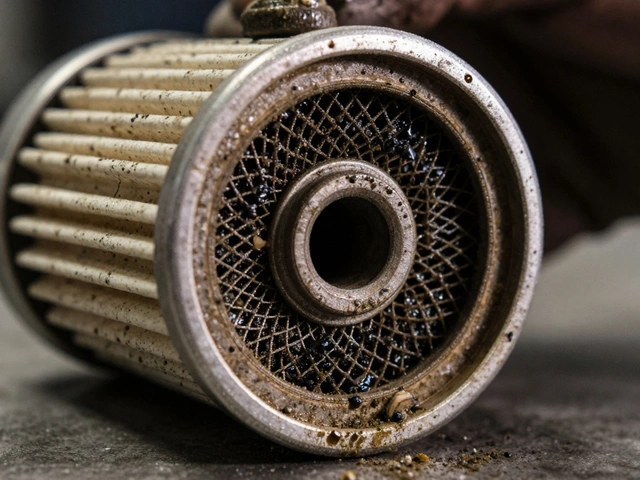Driving smoothly down the road, the last thing anyone wants is for their car to start hiccuping or, worse yet, to grind to a halt. Often, this nightmare scenario can be traced back to a little component quietly working under the hood: the fuel pump. While small, it plays a mighty role in ensuring the life-blood of your engine, gasoline, flows efficiently from the tank to the engine.
Recognizing the symptoms of a failing fuel pump can save you both time and money. Whether it's trouble starting, unexpected sputtering at highway speeds, or just a pronounced lack of power, early detection can make a world of difference. Ignoring these signs might mean being stranded at the most inconvenient times.
We'll dive into how your car might try to tell you something's wrong. Simple maintenance and attentive care can keep the pump, and your vehicle, running smoothly for miles to come. So buckle in as we uncover the less glamorous but critical side of vehicular health.
- Understanding the Role of the Fuel Pump
- Common Signs of a Failing Fuel Pump
- Why Early Detection is Crucial
- Preventative Maintenance Tips
- When to Seek Professional Assistance
Understanding the Role of the Fuel Pump
Deep in the heart of your vehicle's functionality lies an unsung hero—the fuel pump. This component is critical for getting gasoline from the tank to the engine. Without it, your car isn't just at a standstill; it's lifeless. The pump ensures that a precise amount of fuel consistently reaches the engine's combustion chamber, enabling all systems to operate smoothly. Such meticulous operation significantly impacts vehicle performance and fuel efficiency.
Fuel pumps come in different types, such as mechanical and electric, each suited for various vehicles with unique fueling systems. While older models commonly employed mechanical pumps, most modern vehicles rely on electric ones designed for efficiency and higher pressure handling. The magic of electric fuel pumps lies in their ability to maintain a consistent pressure, a crucial factor as modern engines are more delicate about fuel consistency and timing.
"A reliable fuel pump ensures every engine cycle hits the perfect stride," notes automotive expert J.D. Power, echoing how vital these parts are in everyday driving experiences.
When looking at how fuel pumps function, imagine it as a bridge between your fuel tank and the engine. This bridge, or fuel pump, must overcome various challenges to do its job. For instance, it needs to operate efficiently regardless of the tank's fuel level or driving conditions, whether idling in traffic or cruising on a highway. Missteps in any part of this process can lead to reduced performance or even total engine failure, stressing the importance of a robust fuel pump.
The Intricacies of Fuel Pump Systems
Inside the mechanism, you’ll find components like the filter and pressure regulator, each with a specific role. The filter prevents contaminants from entering the fuel line, upholding engine health, while the regulator ensures that the pressure remains within designated levels. Experienced drivers and automotive enthusiasts know that these elements work cohesively to maintain a car’s health. Regular inspections and prompt maintenance can often spot potential issues before they escalate into costly repairs or irreversible damage.
Given how pivotal the fuel pump is, investing time in understanding its operation offers tangible benefits. Drivers who pay attention to the tell-tale signs of a failing pump, like unusual noises or decreased fuel efficiency, can preemptively adjust their maintenance schedules. Knowing what affects a pump's longevity, such as ignoring low fuel levels, can greatly extend its operational life, proving useful knowledge for anyone looking to maximize the performance of their vehicle.
Common Signs of a Failing Fuel Pump
Imagine rolling down the open highway, only for your vehicle to suddenly lose power as if it decided to take a break before you. This frustrating experience is a hallmark sign that something might be amiss with your car's fuel pump. An unreliable fuel supply often translates into your car stuttering or hesitating, especially when trying to accelerate. This symptom is due to the inconsistent pressure within the lines, leading to a staccato delivery of fuel to the engine. Think of it as an orchestra missing a few key players; the result just doesn’t sound—or in this case, feel—quite right.
One of the more noticeable signs, particularly in the morning when you’re in a rush, is a vehicle that refuses to start. Initially, you might dismiss it as a common cold-weather problem, but if the issue persists, a failing fuel pump could very well be the culprit. What's happening is that the pump is struggling to push adequate amounts of fuel from the tank to the engine, much like drinking a thick milkshake through a narrow straw; it takes more effort than normal, and the effort might not always be fruitful.
Strange, often loud whining noises coming from the fuel tank area are another red flag to watch for. While not every unusual noise indicates trouble right away, a persistent or increasingly loud hum can point toward an internal problem within the pump. This sound is akin to a warning siren, letting you know to check things sooner rather than later. According to the Car Care Council, “Regular maintenance can drastically reduce the risk of being caught off-guard by a noisy fuel pump.”
Economic fallout in your wallet is another silent indicator—lower fuel efficiency might be whispering a tale of woe regarding your pump. If you notice you're hitting the gas station more often without any change in driving habits, that could be a sign your car isn't getting the fuel it needs efficiently. Fuel system components working harder than they should often consume more fuel, which in turn can eat into the fuel economy you once took for granted.
A more dangerous symptom comes when your vehicle stalls randomly, especially at high speeds. This isn't just inconvenient; it's potentially hazardous. If your car shuts down in the middle of traffic, it can create precarious situations. This stalling happens because the pump might provide insufficient fuel pressure, causing the engine to effectively run out of gas despite a full or adequate fuel tank. This unpredictability is not only jarring but should be a prompt to seek mechanical assistance without delay.
For the more technologically inclined, modern vehicles come with error codes that can sometimes reveal a failing fuel pump. These codes, when scanned with the right tool, can indicate pressure irregularities or electrical malfunctions linked to the pump. However, these clues are often hidden in plain sight unless you know to look for them and can guide a professional diagnosis remarkably.

Why Early Detection is Crucial
When your car begins to exhibit signs of a fuel pump failure, paying attention sooner rather than later can save you a world of headache. Much like the human body, your vehicle gives off warning symptoms before a critical issue arises. Ignoring these can lead to a cascade of damage resulting in costly repairs and potential safety hazards. One of the more pressing outcomes is the prospect of being stranded. A failing pump leads to inadequate fuel delivery, which might cause your engine to sputter on the highway or refuse to start when you need it most. Such situations not only inconvenience you but could endanger your safety and put you in risky positions on busy roads.
Beyond immediate inconvenience, a failing fuel pump can also affect other parts of your car. For instance, when the pump can't supply enough fuel, the engine might overheat, leading to damage in the long term. This overheating could affect vital components such as the pistons or spark plugs. Experts suggest that instances where the car struggles to maintain power or fails during acceleration could indicate a fuel system problem. According to automotive expert Dennis Fowler, "A misdiagnosed fuel pump issue can lead to a domino effect of engine trouble, costing far more in repairs than early diagnostics might have."
"Attending to a fuel pump issue early can mean the difference between a minor repair and an engine overhaul," says Fowler.
Statistics show that the average cost of replacing a fuel pump revolves around a few hundred dollars. However, neglecting the problem could escalate the issues, potentially reaching into the thousands if additional components like the fuel injectors or catalytic converter are compromised. Regular maintenance checks can reveal inconsistencies in fuel pressure, often showcasing pump problems before they manifest into full-blown trouble. Scheduling these routine checks can be integral to your vehicle maintenance plan.
Aside from regular maintenance, staying alert to changes in your car's performance is key. For instance, a sudden drop in fuel efficiency is more than just a drain on your wallet; it might be the car's way of hinting that the fuel pump isn't working optimally. If you sense something awry, it could be wise to run a diagnostic test using a computerized system to gauge the precise issue. This proactive measure can pinpoint failing components earlier and help you address them swiftly. Remember, vehicles are more communicative than we often give them credit for – the key is to listen.
Preventative Maintenance Tips
Keeping your car's fuel pump in top-notch condition doesn't have to be a daunting task. It's all about understanding its needs and making sure you incorporate a few simple habits into your regular car care routine. A little effort can significantly extend the life of your vehicle's fuel system, therefore saving you from potential headaches and unexpected repair costs in the long run.
First and foremost, never make it a habit of driving your car on an empty tank. When the fuel level gets too low, the pump has to work harder to pull fuel and keep your car moving. This not only creates extra stress on the pump but can also lead to overheating, given that the gasoline sitting in the tank actually helps to keep the pump cool. Additionally, the debris and sediments that naturally settle at the bottom of the tank can clog the pump if frequently picked up, leading to undue wear and tear. According to auto experts, keeping at least a quarter tank full can minimize these risks, ensuring smooth and reliable performance.
"A fuel pump is a hardworking component that, like any other part of the car, deserves some pampering. Regular maintenance, like keeping the right fuel level, can prolong its life and optimize performance," says John Thomas, a renowned automobile engineer and columnist at Auto Repair Today.
Next on the list is routine fuel filter replacement. The fuel filter is your pump's best friend, trapping contaminants and preventing them from traveling down the fuel line. Over time, these filters can become clogged, restricting the flow of fuel and making the pump work harder than it should. The general rule of thumb is replacing the fuel filter every two years or 30,000 miles, but this can vary based on the vehicle's age and driving conditions.
It's also wise to monitor and use high-quality gasoline. The right fuel can greatly enhance your vehicle's efficiency and the fuel pump's longevity. Lower-octane or contaminated fuel can cause buildup in the pump and other components, leading to increased wear. Always choose reputable fuel stations and, when possible, opt for fuel brands that adhere to Top Tier Detergent Gasoline standards to ensure a cleaner and more efficient burn.
An often overlooked, yet vital, practice is routinely listening to your engine. If you notice any peculiar noises, like whining or buzzing sounds from the tank area, it could be a sign that your pump needs attention. Taking swift action can prevent escalation into significant issues. Proactively inspecting for symptoms of fuel pump failure can save you from being stranded and can keep repair costs manageable.
Finally, invest in regular service inspections from professionals who can diagnose subtle issues before they spirally become larger problems. Regular check-ups involve inspecting not just obvious parts, but also ensuring the fuel system remains free from leaks and wear that might go unnoticed until it’s too late. This preventative tactic won't just enhance your car's lifespan but also make every journey safer and more enjoyable.
To sum it up, maintaining your vehicle's fuel pump doesn't require a massive overhaul of your existing routines, just mindful additions. Follow these steps, and you'll help your vehicle stay roadworthy, securing a reliable ride today, tomorrow, and for many years to come.

When to Seek Professional Assistance
Identifying the precise moment to hand over your car to a trusted mechanic can be the difference between a minor repair and a major overhaul. If you've started noticing symptoms that indicate your fuel pump failure, such as sputtering engines, power loss during acceleration, or an unusually noisy pump, it's time to consult a professional. While some savvy car owners might feel inclined to diagnose issues themselves, the fuel system is complicated and demands a specialized understanding that only trained technicians possess.
One undeniable sign that you need a professional is persistent starting problems. If your vehicle struggles or takes much longer than usual to start, this symptom could point directly to an ailing fuel pump. Professionals have the diagnostic tools necessary to confirm whether the car fuel system is delivering the correct pressure needed for the engine to function optimally. Ignoring these cues often leads to additional strain on your vehicle's battery and starter, turning what could be a straightforward fix into something more complex and expensive.
It's also important to note any irregular behavior during idling. Does your car shake or feel like it's about to stall while at a standstill? This is yet another clue that may suggest it's time for professional intervention. Sophisticated shops use diagnostic computers that can read error codes from your car's onboard computer, pinpointing issues that aren't evident to the naked eye. By seeking expert advice, you're not just addressing the symptoms, but potentially uncovering other underlying issues that might escape a less experienced eye.
"A consistent decline in fuel efficiency is a red flag," warns auto expert John Fisher, "Drivers often overlook this, attributing it to normal wear and tear." When you notice frequent visits to the fuel station without any noticeable change in your driving habits, it's wise to let a technician examine the vehicle. A declining fuel economy might indicate that your vehicle's car fuel system isn't operating as it should.
Finally, don't underestimate the smell of gasoline. While it's normal to catch a whiff now and then, a strong and persistent smell could mean a leak somewhere in the system, often linked to a malfunctioning pump. Attempting to fix such issues at home risks not just mechanical failure, but safety—that's why professional assistance is paramount. Mechanics will have the proper safety protocols in place to handle potentially hazardous situations, ensuring your car is safe and operable again.






